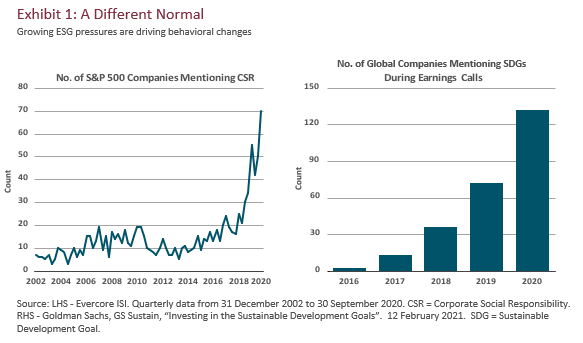There’s a school of thought in parts of the investment community that the increasing focus on corporate sustainability is the ultimate win-win.
This group contends that if employers pay their people more, it will result in higher sales and productivity and will ultimately reduce costs. They reason that cutting emissions will not only help the planet, but also bolster companies’ bottom lines. Unfortunately, the reality couldn’t be further from the truth. Sustainability isn’t free, and efforts to become more sustainable will challenge many companies and perhaps even bankrupt some of them.
Accelerating trends
The pandemic accelerated many well-documented secular trends such as digital media, cloud computing and work-from-home. But it also hastened less obvious ones, such as loneliness, wealth inequality and interestingly, investor demand for changes in corporate behaviour.
While we can point to numerous data points to illustrate mounting investor interest in ESG through fund flows, to us, what’s more most noteworthy is the growing recognition by management teams of the need for more sustainable business practices. For instance, as shown on the left-hand side of exhibit 1 (below), there was a jump in the number of S&P 500 companies that referenced corporate social responsibility (CSR) in quarterly earnings calls during 2020. The right-hand side of the exhibit looks at the number of global companies that referenced, during earnings calls, any of the 17 Sustainable Development Goals (SDGs), a set of global objectives agreed to by the UN General Assembly in 2015 to improve the quality of life worldwide. It shows a similarly large year-on-year increase.

Why sustainability matters
There is a long list of reasons why civil society, governments and special interest groups have been concerned with ESG issues. The most notable one, of course, is that addressing them is critical to the long-term success of our global community. The ramifications, for example, of issues such as runaway climate change or rising income inequality, if left unresolved, are likely to be profoundly negative.
Our point of emphasis, however, is the changing reaction function of companies. Now that investors are focusing on sustainable business practices, management teams have begun to pay attention. And that matters. A lot.
Materiality is key
Sustainability will drive new business opportunities for some while exacerbating risks for others, leading to substantial divergences in the long-term enterprise value of many companies. But what is largely lost in the current ESG narrative is financial materiality. Which of course affects financial asset prices.
A sharp rise in the US minimum wage, for instance, would no doubt challenge a number of business models. Certain retailers would face particular challenges. If companies in this sector are going out of business at an alarming rate while paying the US federal minimum wage of $7.25 an hour, how can they possibly hope to survive if the wage increases to $15? Some retailers will be able to adapt due to their competitive positioning or other strengths, and in fact some already have, with bonuses and salary increases since the pandemic began, but many will find that sustainability concerns pose major challenges to their profitability.








